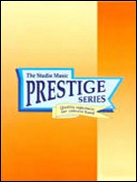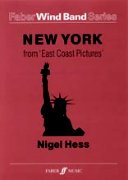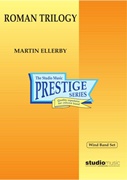Results
-
£85.00
MOCKBEGGAR VARIATIONS (Concert Band) - Woolfenden, Guy
Includes: Prelude, Theme and Five VariationsUnlike my other pieces for concert band, Mockbeggar Variations has no roots in any of my work for the Royal Shakespeare Company, but resulted from a commission by Robert Roscoe for the Berkshire Youth Wind Orchestra, with funds provided by the Berkshire Young Musicians Trust. Robert, on learning that I was stuck for a suitable title, and noting my penchant for the unusual, suggested the address of the Trust - Mockbeggar House - might take my fancy.The Prelude hints at the melodic and harmonic material of the Theme, which appears in the thirty-first bar, distributed between various solo instruments and small groups of players. The five succeeding variations are contrasted in mood, tempo, style and instrumentation.A large part of the score was written in a chalet high in the Swiss Alps with a continual clangour of sixteen different pitches of cow bell constantly ringing in my ears. There is no Mahlerian hint of this in the music, nor was my wife, Jane, successful in shooing the cows away or muffling their bells.....! - GW
Estimated dispatch 7-14 working days
-
 £27.95
£27.95MOSAIC (Prestige Concert Band Extra Score) - Turnbull, Kit
Extra Score. Mosaic is an ancient ornamental art form that involves fitting together small pieces to form a larger design. In a like way, the opening movement of this work contains a number of short musical statements, based around the interval of a tritone, which are used, both melodically and harmonically in its construction. (Grade 5) Performance time 11'44'' Recorded on Polyphonic QPRM152D MOSAIC: Great British Music Vol. 13 (Royal Northern College of Music Wind Orchestra)
Estimated dispatch 7-14 working days
-
 £137.95
£137.95MOSAIC (Prestige Concert Band Set) - Turnbull, Kit
Score and Parts. Mosaic is an ancient ornamental art form that involves fitting together small pieces to form a larger design. In a like way, the opening movement of this work contains a number of short musical statements, based around the interval of a tritone, which are used, both melodically and harmonically in its construction. (Grade 5) Performance time 11'44'' Recorded on Polyphonic QPRM152D MOSAIC: Great British Music Vol. 13 (Royal Northern College of Music Wind Orchestra)
Estimated dispatch 7-14 working days
-
 £65.00
£65.00New York (from East Coast Pictures) (Concert Band - Score and Parts) - Hess, Nigel
New York - or to be more precise, Manhattan. For anyone who is familiar with this bizarre and wonderful city, here is a 'picture' that needs no explanation. For those not yet hooked this is a foretaste of things to come!This piece forms the final movement of 'East Coast Pictures', commissioned by the British Youth Wind Orchestra with funds from the National Westminster Bank plc. It is a suite of three short 'pictures' that were inspired by several visits to a small part of the American East Coast, an area that provides great extremes in the geography and the people.Duration: 6.00
Estimated dispatch 7-14 working days
-
 £184.95
£184.95PARTITA for Concert Band (Darrol Barry) (Prestige Concert Band - Score and Parts) - Barry, Darrol
This work is cast in four movements: Introit; Impromptu; Elegy (31.12.04); Finale. Grade 5. (Recorded on QPRM150D, CHIVALRY, Royal Northern College of Music Wind Orchestra) PARTITA FOR CONCERT BAND is cast in four movements: Introit - begins majestically with brass, saxes and percussion carrying the main theme from which most of the following ideas originate. It is repeated by the woodwinds and moves via a solo side drum into the piu mosso. New ideas are introduced by trombones, the horns and euphoniums leading to the central idea played by oboe. This leads, in turn, via full band to the closing movement. 2. Impromptu -once again the opening theme is the basis of the whole movement, using most of the composer's tricks, augmentation, retrograde, inversion and fugato, it moves along in a very confident style. A muted solo trumpet links into the third movement. Elegy (26/12/04) - this movement was prompted by the devastating events of Boxing Day 2004, the Asian Tsunami. The movement opens bleakly until a solo flute gives us the main theme over a troubled accompaniment. The opening mood returns but timpani and tam-tam herald return of the main theme for the full band. The opening theme is heard again as the music subsides but never settles. Finale - this spirited 6/8 vivo opens up with percussion and horns and trumpets announce the main idea, punctuated with short chords from the lower band. A new four bar theme is heard over a bass tread, the theme overlaps itself and quavers swirl up and down the band. Material from the first movement is heard transformed by the energy of the finale and the music surges towards a sudden close. Performance time: 15:35
Estimated dispatch 7-14 working days
-
 £44.95
£44.95PARTITA for Concert Band (Darrol Barry) (Prestige Concert Band - Score only) - Barry, Darrol
This work is cast in four movements: Introit; Impromptu; Elegy (31.12.04); Finale. Grade 5. (Recorded on QPRM150D, CHIVALRY, Royal Northern College of Music Wind Orchestra) PARTITA FOR CONCERT BAND is cast in four movements: Introit - begins majestically with brass, saxes and percussion carrying the main theme from which most of the following ideas originate. It is repeated by the woodwinds and moves via a solo side drum into the piu mosso. New ideas are introduced by trombones, the horns and euphoniums leading to the central idea played by oboe. This leads, in turn, via full band to the closing movement. 2. Impromptu -once again the opening theme is the basis of the whole movement, using most of the composer's tricks, augmentation, retrograde, inversion and fugato, it moves along in a very confident style. A muted solo trumpet links into the third movement. Elegy (26/12/04) - this movement was prompted by the devastating events of Boxing Day 2004, the Asian Tsunami. The movement opens bleakly until a solo flute gives us the main theme over a troubled accompaniment. The opening mood returns but timpani and tam-tam herald return of the main theme for the full band. The opening theme is heard again as the music subsides but never settles. Finale - this spirited 6/8 vivo opens up with percussion and horns and trumpets announce the main idea, punctuated with short chords from the lower band. A new four bar theme is heard over a bass tread, the theme overlaps itself and quavers swirl up and down the band. Material from the first movement is heard transformed by the energy of the finale and the music surges towards a sudden close. Performance time: 15:35
Estimated dispatch 7-14 working days
-
 £97.02
£97.02Prayer for Asia
"Prayer For Asia" is an original work for wind orchestra whose main theme was inspired by prayer. Simple and pure in its core, exponentially powerful harmonic and textural scoring make this work both music for the musician and soul food for a new generation of audiences here and abroad. The imagery of this musical entreaty tranquilly unfolds with a clarinet exposition that authentically captures the essence of an invocation that is adeptly passed to English Horn and masterfully developed via sectional highlighting, superlative percussion and a climax of elysian dimension. "Prayer For Asia" conveys reverence and paramount reflection that will, perhaps now more than ever, touch mature ensembles and audiences in a significant manner.
Estimated dispatch 7-14 working days
-
 £32.95
£32.95RAIL (Prestige Concert Band Extra Score) - Josephs, Wilfred - Odom, Lawrence
Extra Score. This work was originally written for a film about British railways. Josephs did not intend the music to emulate train sound-effects, but rather act as a synthesis of a train journey through the English countryside and the gradual changes from steam to diesel and gas-light to electricity. Performance time 9'29" Grade 5 (Recorded on QPRM143D DREAMSCAPES, Royal Northern College of Music Wind Orchestra)
Estimated dispatch 7-14 working days
-
 £164.95
£164.95RAIL (Prestige Concert Band Set) - Josephs, Wilfred - Odom, Lawrence
Score and Parts. This work was originally written for a film about British railways. Josephs did not intend the music to emulate train sound-effects, but rather act as a synthesis of a train journey through the English countryside and the gradual changes from steam to diesel and gas-light to electricity. Performance time 9'29" Grade 5 (Recorded on QPRM143D DREAMSCAPES, Royal Northern College of Music Wind Orchestra)
Estimated dispatch 7-14 working days
-
 £164.95
£164.95Roman Trilogy (Prestige Concert Band - Score and Parts) - Ellerby, Martin
This work falls into three movements, all concerned with the subject of the Italian capital city of Rome, rather like previous tributes to other European citites in Paris Sketches, Venetian Spells and The Cries of London. The emphasis is on atmosphere and drama, be they respectful or joyful! It is acknowledged that Ottorino Respighi has influenced this work though his own eternal Rome tributes are not challenged here, rather saluted and celebrated.The three movements are: 1. Collosea di Romaan evergrowing march mood, builds in intensity and density as we approach the mighty Colosseum, the amphitehatre of Classical Rome, where deadly spectacles were once played out. We should not forget that countless thousands died here whilst even more laughed in the name of entertainment: their memory is reflected in the coda. In its unique way this icon of Rome is one of the most tragic historical places.2. Capella Sistinathe Sistine Chapel of the Vatican City is observed in a series of chorales and interludes. The visitor can look 360o around and be presented with a series of Biblical representations and commentaries. The music attempts to reflect these contrasting panels whilst ultimately bowing to the glory of this magnificent artistic creation. The coda is enigmatic, inconclusive - a single viewing cannot reveal all the mysteries and beauties within. 3. Fonatani di Trevitime for laughter and fun! The Trevi Fountain is one of Rome's finest and visually overboard locations! This is indicated as a Burletta: 'a la dolce vita' which means 'the sweet life'. This burletta (meaning 'little joke') makes use of tarantella and saltarello rhythms and features a pair of tambourines which are associated with these forms. La Dolce Vita was also a film by the renowned Italian director Federico Fellini featuring a memorable scene in the Trevi with a wet Enita Ekberg: something modern day visitors are discouraged from emulating!Duration: 11:15Recorded on Polyphonic QPRM161D ROMAN TRILOGY (TheRoyal Northern College of Music Wind Orchestra).
Estimated dispatch 7-14 working days
